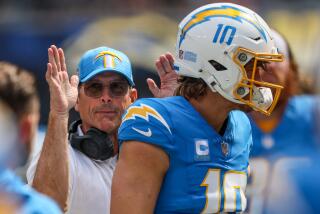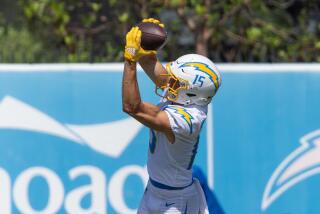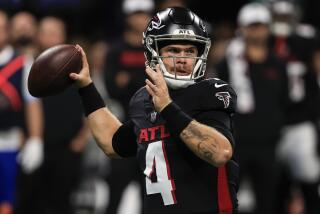COCAINE AND A SUPER BOWL TEAM: THE LAST STRAW : Patriots’ Action Brings a Swift Reaction : Chargers Say They’re Clean, Some Players Open to Drug Testing
- Share via
SAN DIEGO — The Chargers, a team whose recent history includes some instances of cocaine involvement, now appear to be clean, according to owner Alex Spanos and a sampling of players.
Spanos, an advocate of random drug testing, said Tuesday he doesn’t believe there are any Charger players with a cocaine problem.
Defensive back Danny Walters and linebacker Mike Green, both of whom had been linked to cocaine abuse, underwent drug testing during the regular season and were found to be free of drugs, Spanos said.
Ex-Charger running back Chuck Muncie, who underwent three periods of drug rehabilitation, retired early in the 1985 season after signing with the Minnesota Vikings.
“As far as we can determine, the Chargers have no more players with a problem,” Spanos said. “My policy is that I will do all I can to help a player who comes forward with a problem and wants to be rehabilitated. But if it happens a second time, the player is gone.”
Spanos said the cocaine problem in the National Football League can be remedied only with the adoption of mandatory spot drug testing, and he hopes such a policy will be part of a new collective bargaining agreements between players and management.
Charger quarterback Dan Fouts said last summer he would not object to such a policy, and a group of players interviewed Tuesday also indicated a willingness to submit to random tests.
The subject came up in the wake of revelations that as many as 12 members of the New England Patriots have drug problems. The team voted after the Super Bowl to allow voluntary testing.
“The owners are paying us good money and we have an obligation to be clean,” said Charger linebacker Linden King. “If a guy wants to save his money, he can buy Peru when he retires, but if he can’t stay clean while he’s playing, he’s got no business here.
“I’ve got nothing to hide. I’ll (urinate) in a cup everyday. I don’t see testing as an insult or invasion of my privacy. I’m not hung up on ethics or the Constitution. I think a lot of players would agree with me, but would be afraid to say so because they want to be accepted in various (social) circles.”
King, along with running back Lionel James, offensive tackle Jim Lachey and tight end Eric Sievers, said the Chargers are clean now for the first time in several years.
“I’d sure like to feel we’re free of drugs now,” Sievers said. “Obviously, it (drug use) has hurt us in the past, if you look at the losing records in 1983 and 1984.
“The players who would be afraid of testing are the ones who should be--guys with something to hide. I don’t. And I don’t think testing is degrading. Any player who is scared of testing is a man we don’t need on this team.”
Lachey, a rookie, said he saw no evidence of cocaine use this year. “Maybe I’m naive,” he said, “but I’d be shocked to find out there was any.
“Individually, testing wouldn’t bother me, but I’d want the whole team to discuss it and vote on it first. I think testing would help get rid of the stigma that’s attached to guys with nothing to hide. I sure don’t want players on our team who could cost us a game.”
James said he would vote against spot testing, but only because it’s a violation of the current collective bargaining agreement.
“This is a complex issue involving the privacy of the players versus the owner’s right to expect his players to be at their best,” James said.
“It’s OK, but it’s not OK. I’m for privacy, but I certainly see the owner’s side, too. I think our team probably would be split, but if it came to a vote, they’d probably vote for what the players’ association wanted.”
Assistant head coach Al Saunders agreed that many innocent players are troubled by the stigma of drug abuse.
“It might be naive to think we wouldn’t at some point have the same problems that plague society in general,” Saunders said.
“I don’t see any reason to change our current approach. We certainly favor voluntary testing. The goal we should all address is the eradication of drug use in pro football. I’m sure there will be pressure in the negotiations for a new collective bargaining agreement to adopt a program of testing.”


